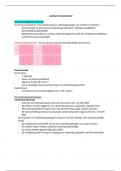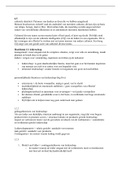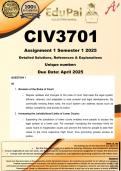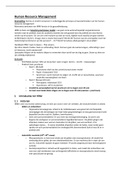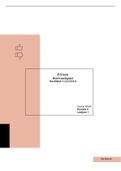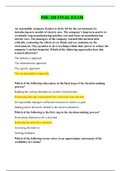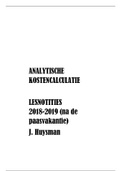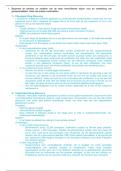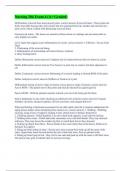Study (1918-45)
History Cambridge IGCSE (9-1)
What effect did the war have on Germany?
The war ended in 1918 and left Germany crumbling after being defeated. Over a million German
soldiers were dead and civilians faced starvation.
● Political Effects
○ The Reichstag was weak and no one had a say in how Germany was run.
○ Germany was ruled as a military dictatorship by the Kaiser and his army leaders
Ludendorff and Hindenburg.
○ There was no opposition to the Kaiser.
○
● Physical Effects
○ Farming was disrupted as farm workers were drafted into the armed forces. By
1918, Germany was only producing 50% of the milk, and 60% of the butter and
meat which had been produced before the war.
○ They could not import food because the British navy blockaded German ports
during the war. German people faced starvation. More than 750,000 Germans
died because of these food shortages.
● Psychological Effects
○ Before the war, Germans were proud and ambitious of their country. They were
prepared for hard work and success.
○ The war made the Germans bitter and angry and they looked for someone to
blame.
○ There was a lot of conflict.
The abdication of Kaiser Wilhelm II
The Allies offered peace but on the condition that the Germans got rid of the Kaiser whom they
blamed for starting the war. The Tsar refused to abdicate.
25 Oct 1918: Naval commanders at Kiel decided to send ships to fight the British fleet but the
sailors mutinied.
, Was the Wiemar Republic doomed from the start?
26 Oct - 5 Nov: The Kaiser didn't send the army to crush the mutiny and it was followed by
strikes against the war and the Kaiser all over Germany. Soldiers mutinied and joined the
protests.
6 Nov: Soldiers’ and workers’ councils had taken control in many cities. Their aim was to end
the war but to the politicians, it looked like there was a danger of revolution.
7 Nov: Social Democrat leaders sent an ultimatum to the Kaiser that unless he abdicated they
would join the revolution.
9 Nov: General strike in Berlin. SDs were worried that extremists would gain control of the
revolution so one of Ebert’s colleagues announced the Kaiser’s abdication and setting up of the
German Republic. Ebert took over as Chancellor.
The Spartacist Uprising: January 1919
● Through December 1919 there were regular clashes between the government and
revolutionaries.
● Spartacists wanted to get rid of Ebert’s government.
● On 5th January the Spartacists captured the headquarters of the government’s
newspaper and telegraph bureau.
● The uprising was badly prepared and was crushed by the Freikorps.
● 100 Spartacists, 13 Freikorps, Rosa Luxemburg and Karl Liebknecht (Spartacist leaders)
were killed.
● Over the next 4 months, the Freikorps killed thousands more Communist supporters.
● Ebert won but had to put his government under into the hands of the army and Freikorps
(right wings) who couldn’t be trusted.
● Working classes felt betrayed.
Why did the Germans hate the Treaty of Versailles?
France wanted the treaty to weaken Germany so that there wouldn’t be a chance of it attacking
France in the future. Germany was not invited to the negotiations so the treaty was agreed by
the Allies. Germany was forced to sign.
● Germany had to accept war guilt. This was the term which was the most resented
because the war had been an act of self-defence to them.
● As Germany was held responsible for the war, the Allies claimed reparations for the
damage caused during the war on them. Germany had to pay £6600 million, even
though the ToV had also taken 10% of their industry and 15% of its agricultural land.
● The French desire for security meant that the German armed forces had to be restricted:
○ Air Force disbanded
○ Army reduced to 100,000 soldiers
○ Navy limited to 15,000 sailors, 6 battleships and no submarines
○ No troops allowed in the Rhineland
● Germany lost 13% of its land, which contained about 6 million of its people:
○ Alsace-Lorraine was returned to France

